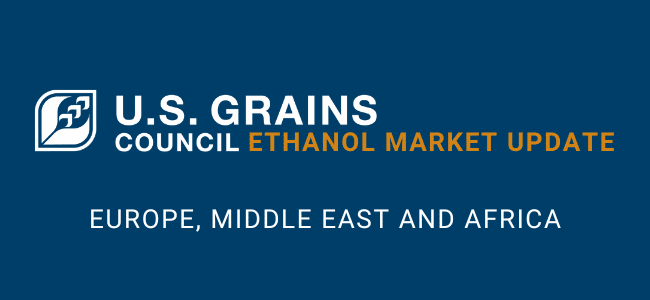This is part of a recurring series of articles featuring outlooks for specific markets in which the U.S. Grains Council works.
During the 2021/2022 marketing year, the Europe, Middle East, Africa (EMEA) region accounted for 16 percent of U.S. ethanol exports, totaling around 196 million gallons (69.6 million bushels in corn equivalent). Imported ethanol was used for both fuel and industrial purposes.
The U.S. Grains Council’s (USGC’s) EMEA office has compiled a market research document that reviews ethanol’s market potential, market development efforts to date, the current market situation and what the future may hold in the region. A preview of that information can be found below, with a link to the full document at the end.
Europe
In Europe, there is an increased demand for fuel ethanol in Europe’s major consuming countries including France, Germany and the United Kingdom (U.K.). This increased demand for fuel ethanol is driven by the increased price differential between the higher-priced gasoline at the pump and E5, E10 and E85 blends.
“The EU is a region with increasingly ambitious commitments that aim to decrease greenhouse gas (GHG) emissions, and we are continuing to work with allies on the ground to ensure bioethanol has a growing role in future policies,” said Ramy Taieb, USGC regional director for Europe, the Middle East and Africa.
However, the escalating prices of energy in the European Union (EU) coupled with limited feedstock flows from the Black Sea region and limited alternatives are concerning ethanol producers in the EU and reducing their current margins.
Middle East
Today, there is an aggressive stance against GHGs through Saudi Arabia’s Vision 2030 and the United Arab Emirates’ (UAE’s) Vision 2021. Oman Oil Marketing Company (OOMCO), for example, has signed an agreement with Wakud International to procure biodiesel to OOMCO’s customers, which shows that the continent is looking for other alternatives to reduce its carbon footprint. Looking forward, the Council is monitoring policy changes in the region to ensure an E10 policy will be one of the solutions to net-zero commitments.
Africa
African oil demand is recovering steadily, reaching pre-coronavirus pandemic levels, and the continent is set to experience the strongest growth in consumption among the continents of the world due to its considerable demographic and economic growth. This rapidly growing African fuels market will be a catalyst to creating an E10 policy environment and regulatory change for the countries the Council is heavily engaged in, such as Egypt, Nigeria, Ghana and South Africa.
“Africa is a region with a growing gasoline market and E10 is a starting point for new policies throughout the continent,” Taieb said.
About The U.S. Grains Council
The U.S. Grains Council develops export markets for U.S. barley, corn, sorghum and related products including distiller’s dried grains with solubles (DDGS) and ethanol. With full-time presence in 28 locations, the Council operates programs in more than 50 countries and the European Union. The Council believes exports are vital to global economic development and to U.S. agriculture’s profitability. Detailed information about the Council and its programs is online at www.grains.org.

